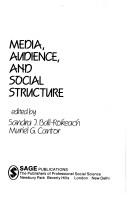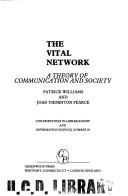| Listing 1 - 6 of 6 |
Sort by
|
Book
ISBN: 9781032115634 9781032111605 1032111607 1032115637 1003220460 1000578798 1003220460 Year: 2022 Publisher: Milton Taylor & Francis Group
Abstract | Keywords | Export | Availability | Bookmark
 Loading...
Loading...Choose an application
- Reference Manager
- EndNote
- RefWorks (Direct export to RefWorks)
"This supplemental text provides an inside look at the discipline of Communication Studies through a series of essays in which top scholars from a wide range of subfields discuss how they've experienced and how they study the crucial issues of our time. The 2020s opened with a series of events with massive implications for the ways we communicate, from the COVID-19 pandemic, a summer of protests for social justice, and climate change related natural disasters, to one of the most contentious presidential elections in modern U.S. history. The essays in this book provide snapshots of many of these issues as seen through the eyes of a specialist in the major subfields of communication studies, including interpersonal, organizational, strategic, environmental, religious, social justice, risk, sport, health, family, instructional, and political communication. Written in an informal style that blends personal narrative with accessible explanation of basic concepts, the book is ideal for introducing students to the range and practical applications of communication studies. This text makes an accessible supplementary text for Introduction to Communication, Introduction to Graduate Studies, and Capstone courses, and will also interest students considering studying Communication"--

ISBN: 0674779428 0674779436 Year: 1997 Publisher: Cambridge, Mass. Harvard University Press
Abstract | Keywords | Export | Availability | Bookmark
 Loading...
Loading...Choose an application
- Reference Manager
- EndNote
- RefWorks (Direct export to RefWorks)

ISBN: 0803925816 0803925824 9780803925823 Year: 1986 Publisher: Beverly Hills Sage
Abstract | Keywords | Export | Availability | Bookmark
 Loading...
Loading...Choose an application
- Reference Manager
- EndNote
- RefWorks (Direct export to RefWorks)
Mass communications --- United States --- Communication --- Mass media --- Médias --- Social aspects --- Congresses --- Aspect social --- Congrès --- Congresses. --- 316.774:659.3 --- #SBIB:309H402 --- #SBIB:309H022 --- Massamedia--(communicatiesociologie); technologische aspecten zie {659.3}-:-Mass communication. Informing, enlightening of the public at large --- Media en publiekgroepen: gebruik van de boodschap, effecten van de media, ... --- Massacommunicatie --- 316.774:659.3 Massamedia--(communicatiesociologie); technologische aspecten zie {659.3}-:-Mass communication. Informing, enlightening of the public at large --- Médias --- Congrès --- Mass communication --- Media, Mass --- Media, The --- Communication, Primitive --- Sociology --- Social aspects&delete& --- Media en publiekgroepen: gebruik van de boodschap, effecten van de media, .. --- Media en publiekgroepen: gebruik van de boodschap, effecten van de media, . --- Media en publiekgroepen: gebruik van de boodschap, effecten van de media, --- Communication - Social aspects - United States - Congresses --- Mass media - United States - Congresses --- Communication - Social aspects - United States - Congresses. --- Mass media - United States - Congresses. --- United States of America

ISBN: 0313203245 9780313203244 Year: 1978 Volume: 25 Publisher: Westport (Conn.): Greenwood
Abstract | Keywords | Export | Availability | Bookmark
 Loading...
Loading...Choose an application
- Reference Manager
- EndNote
- RefWorks (Direct export to RefWorks)
Mass communications --- Communication --- Communication and traffic --- Mass media --- Library science --- Social aspects --- Vocational guidance --- 316.77 --- -Communication and traffic --- -Library science --- -Mass media --- -#SBIB:309H02 --- #SBIB:303H14 --- Mass communication --- Media, Mass --- Media, The --- Librarianship --- Library economy --- Bibliography --- Documentation --- Information science --- Communications industries --- Traffic --- Transportation --- Communication, Primitive --- Sociology --- Communicatiesociologie --- -Vocational guidance --- -Communicatiewetenschap: algemeen --- Methoden en technieken van de communicatiewetenschap --- 316.77 Communicatiesociologie --- #SBIB:309H02 --- Communicatiewetenschap: algemeen --- Communication - Social aspects - United States --- Communication and traffic - United States --- Mass media - Social aspects - United States --- Library science - Vocational guidance

ISBN: 9780674169869 0674169867 0674169859 9780674169852 Year: 1986 Publisher: Cambridge, Mass. Harvard Business Press
Abstract | Keywords | Export | Availability | Bookmark
 Loading...
Loading...Choose an application
- Reference Manager
- EndNote
- RefWorks (Direct export to RefWorks)
Why do we find ourselves living in an Information Society? How did the collection, processing, and communication of information come to play an increasingly important role in advanced industrial countries relative to the roles of matter and energy? And why is this change recent-or is it? James Beniger traces the origin of the Information Society to major economic and business crises of the past century. In the United States, applications of steam power in the early 1800s brought a dramatic rise in the speed, volume, and complexity of industrial processes, making them difficult to control. Scores of problems arose: fatal train wrecks, misplacement of freight cars for months at a time, loss of shipments, inability to maintain high rates of inventory turnover. Inevitably the Industrial Revolution, with its ballooning use of energy to drive material processes, required a corresponding growth in the exploitation of information: the Control Revolution. Between the 1840s and the 1920s came most of the important information-processing and communication technologies still in use today: telegraphy, modern bureaucracy, rotary power printing, the postage stamp, paper money, typewriter, telephone, punch-card processing, motion pictures, radio, and television. Beniger shows that more recent developments in microprocessors, computers, and telecommunications are only a smooth continuation of this Control Revolution. Along the way he touches on many fascinating topics: why breakfast was invented, how trademarks came to be worth more than the companies that own them, why some employees wear uniforms, and whether time zones will always be necessary. The book is impressive not only for the breadth of its scholarship but also for the subtlety and force of its argument. It will be welcomed by sociologists, economists, historians of science and technology, and all curious in general.
Communication --- Information technology --- Information society. --- Computers and civilization. --- Technologie de l'information --- Société informatisée --- Ordinateurs et civilisation --- Social aspects --- Aspect social --- Information society --- Computers and civilization --- 007.5 --- 34:681.3 --- -Computers and civilization --- -#SBIB:IO --- #SBIB:316.334.2A24 --- IT (Information technology) --- Technology --- Telematics --- Information superhighway --- Knowledge management --- Sociology --- Civilization and computers --- Civilization --- Communication, Primitive --- Mass communication --- Zelfwerkende systemen --- Informaticarecht --- -Social aspects --- -Technologische verandering: algemene ontwikkelingen (mechanisering, automatisering) --- 34:681.3 Informaticarecht --- 007.5 Zelfwerkende systemen --- Société informatisée --- #SBIB:IO --- Technologische verandering: algemene ontwikkelingen (mechanisering, automatisering) --- Social change --- Computer. Automation --- United States --- Communication - Social aspects - United States --- Information technology - Social aspects - United States --- United States of America

ISBN: 0803972091 9780803972094 Year: 1995 Publisher: Thousand Oaks (Calif.): Sage
Abstract | Keywords | Export | Availability | Bookmark
 Loading...
Loading...Choose an application
- Reference Manager
- EndNote
- RefWorks (Direct export to RefWorks)
Hate speech --- Oral communication --- Freedom of speech --- Social aspects --- #SBIB:309H517 --- Verbale communicatie: sociale psychologie van de taal en de interactie, psycholinguistiek --- Oral transmission --- Speech communication --- Verbal communication --- Communication --- United States --- Social conditions --- ABŞ --- ABSh --- Ameerika Ühendriigid --- America (Republic) --- Amerika Birlăshmish Shtatlary --- Amerika Birlăşmi Ştatları --- Amerika Birlăşmiş Ştatları --- Amerika ka Kelenyalen Jamanaw --- Amerika Qūrama Shtattary --- Amerika Qŭshma Shtatlari --- Amerika Qushma Shtattary --- Amerika (Republic) --- Amerikai Egyesült Államok --- Amerikanʹ Veĭtʹsėndi︠a︡vks Shtattnė --- Amerikări Pĕrleshu̇llĕ Shtatsem --- Amerikas Forenede Stater --- Amerikayi Miatsʻyal Nahangner --- Ameriketako Estatu Batuak --- Amirika Carékat --- AQSh --- Ar. ha-B. --- Arhab --- Artsot ha-Berit --- Artzois Ha'bris --- Bí-kok --- Ē.P.A. --- EE.UU. --- Egyesült Államok --- ĒPA --- Estados Unidos --- Estados Unidos da América do Norte --- Estados Unidos de América --- Estaos Xuníos --- Estaos Xuníos d'América --- Estatos Unitos --- Estatos Unitos d'America --- Estats Units d'Amèrica --- Ètats-Unis d'Amèrica --- États-Unis d'Amérique --- Fareyniḳṭe Shṭaṭn --- Feriene Steaten --- Feriene Steaten fan Amearika --- Forente stater --- FS --- Hēnomenai Politeiai Amerikēs --- Hēnōmenes Politeies tēs Amerikēs --- Hiwsisayin Amerikayi Miatsʻeal Tērutʻiwnkʻ --- Istadus Unidus --- Jungtinės Amerikos valstybės --- Mei guo --- Mei-kuo --- Meiguo --- Mî-koet --- Miatsʻyal Nahangner --- Miguk --- Na Stàitean Aonaichte --- NSA --- S.U.A. --- SAD --- Saharat ʻAmērikā --- SASht --- Severo-Amerikanskie Shtaty --- Severo-Amerikanskie Soedinennye Shtaty --- Si︠e︡vero-Amerikanskīe Soedinennye Shtaty --- Sjedinjene Američke Države --- Soedinennye Shtaty Ameriki --- Soedinennye Shtaty Severnoĭ Ameriki --- Soedinennye Shtaty Si︠e︡vernoĭ Ameriki --- Spojené obce severoamerické --- Spojené staty americké --- SShA --- Stadoù-Unanet Amerika --- Stáit Aontaithe Mheiriceá --- Stany Zjednoczone --- Stati Uniti --- Stati Uniti d'America --- Stâts Unîts --- Stâts Unîts di Americhe --- Steatyn Unnaneysit --- Steatyn Unnaneysit America --- SUA (Stati Uniti d'America) --- Sŭedineni amerikanski shtati --- Sŭedinenite shtati --- Tetã peteĩ reko Amérikagua --- U.S. --- U.S.A. --- United States of America --- Unol Daleithiau --- Unol Daleithiau America --- Unuiĝintaj Ŝtatoj de Ameriko --- US --- USA --- Usono --- Vaeinigte Staatn --- Vaeinigte Staatn vo Amerika --- Vereinigte Staaten --- Vereinigte Staaten von Amerika --- Verenigde State van Amerika --- Verenigde Staten --- VS --- VSA --- Wááshindoon Bikéyah Ałhidadiidzooígíí --- Wilāyāt al-Muttaḥidah --- Wilāyāt al-Muttaḥidah al-Amirīkīyah --- Wilāyāt al-Muttaḥidah al-Amrīkīyah --- Yhdysvallat --- Yunaeted Stet --- Yunaeted Stet blong Amerika --- ZDA --- Združene države Amerike --- Zʹi︠e︡dnani Derz︠h︡avy Ameryky --- Zjadnośone staty Ameriki --- Zluchanyi︠a︡ Shtaty Ameryki --- Zlucheni Derz︠h︡avy --- ZSA --- Η.Π.Α. --- Ηνωμένες Πολιτείες της Αμερικής --- Америка (Republic) --- Американь Вейтьсэндявкс Штаттнэ --- Америкӑри Пӗрлешӳллӗ Штатсем --- САЩ --- Съединените щати --- Злучаныя Штаты Амерыкі --- ولايات المتحدة --- ولايات المتّحدة الأمريكيّة --- ولايات المتحدة الامريكية --- 미국 --- États-Unis --- É.-U. --- ÉU --- Hate speech - United States. --- Oral communication - Social aspects - United States. --- Freedom of speech - United States.
| Listing 1 - 6 of 6 |
Sort by
|

 Search
Search Feedback
Feedback About UniCat
About UniCat  Help
Help News
News